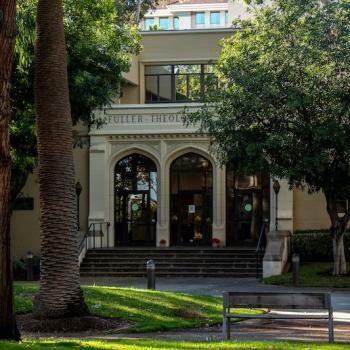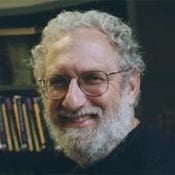I hate to belabor the obvious, but in this time of crazy politics it might serve some purpose.
Are any of the Republican candidates for president Christians?
I know that all of them except Ron Paul have repeatedly said that they are. But is saying that one is Christian all it takes to be one?
By analogy, I can say (for example) that I am brave, that I believe in marital fidelity, or that I love animals. The test of whether or not those statements are true, however, is not just that I say them over and over. To see whether or not they reflect my personal reality, we would have to look at my behavior. Am I able to function despite great danger? Remain faithful to my wife even in the face of temptation? Refrain from eating even the juiciest steak—or at least make some contributions to animal shelters and be patient when my cat scratches the couch? To the extent that I can do those things, then my self-professed courage, fidelity and love for animals are real—and to the extent that I can't, no matter how often I proclaim them, they just aren't there.
I myself am not a Christian, but even a passing examination of New Testament teachings reveals that Christianity is an extremely demanding faith, one that requires virtues that are both rare and quite difficult. (And unless I missed it, I am pretty sure Jesus never said anything to the effect of: "All it takes to follow me is to say "I am a follower.")
For example, Jesus taught that people should not only be fair to others (echoing the traditional Jewish commandment to treat others as one would like to be treated), but also actually love people they considered their enemies. Have we seen Rick Perry or Rick Santorum expressing love for each other? Or for their arch-nemesis Barack Obama? No. Instead we see antagonism, competition, and condemnation. Over and over again. But if these men can't find love even for people whose politics they disdain or against whom they are competing, just to that extenttheyare not Christians.
For another example, we might remember that Jesus quite clearly said that in order to follow him a person needed to be unattached to money, and that in at least one example he required a rich man to donate all his wealth to the poor before he became an active follower.
Has Newt Gingrich (who prides himself on defending Christianity against the "anti-religious bigots") ever eschewed personal wealth—or has he used his position to make tens of millions in consulting fees? Have any of the Republicans ever suggested to the American people that the Christians among them should have something on their mind other than improving our moribund economy? Or that there might be any incompatibility between the ideals of Christianity and those of capitalism?
If they did, I sure missed it.
Actually, what these candidates assure their followers is that one can be a devout Christian (which seems for them to center on eliminating abortion and saying "Merry Christmas" rather than "Happy Holidays) without manifesting any of the paradigm Christian virtues like humility and peacefulness. As long as we reject pornography and eliminate women's rights to control their own bodies, it is perfectly Christian to avoid any critique of vast inequalities in power and wealth, be verbally aggressive and militaristic, and celebrate "American exceptionalism" while being openly contemptuous of other nations and cultures.
If someone argues that it is just not possible to combine Christianity and modern society, that Christianity is a matter of private faith and personal devotion, I would offer two thoughts.
First, if Christianity is a matter of private faith, then perhaps candidates for president should keep it private. We don't need to know any essentially personal facts about them, only about those beliefs and actions which would shape them as political leaders. If Christianity is really too demanding, extreme, or idealistic to shape public life, let these men stop pretending it shapes theirs.
Second, however, while it is no doubt very difficult to combine Christianity and modern political life, some people—some Christians—offer us pretty good examples of trying to do so. Martin Luther King is one case. Any cursory examination of his statements and actions reveals devotion to ideals of freedom, democracy, equal rights, care for the poor, humility, respect for enemies, and peacemaking. Dorothy Day, who went from being a communist to being a devout Catholic, is another example. Her passionate concern for the destitute and relentless opposition to American militarism was joined with a gentle spirit and an open mind.
The upshot of all this is that perhaps it is time for Republican candidates to stop using Christianity as a club to beat up democratic opponents, or latte-sipping, environmentalist and feminist college professors like me, and start using it as a rigorous task master of their own behavior. And that it is also time for serious Christians to ask themselves if the public displays of their religion by politicians actually further its public presence—or make Christianity's spiritual demands seem trivial to non-existent.
What, indeed, would Jesus say about that?
1/17/2012 5:00:00 AM





